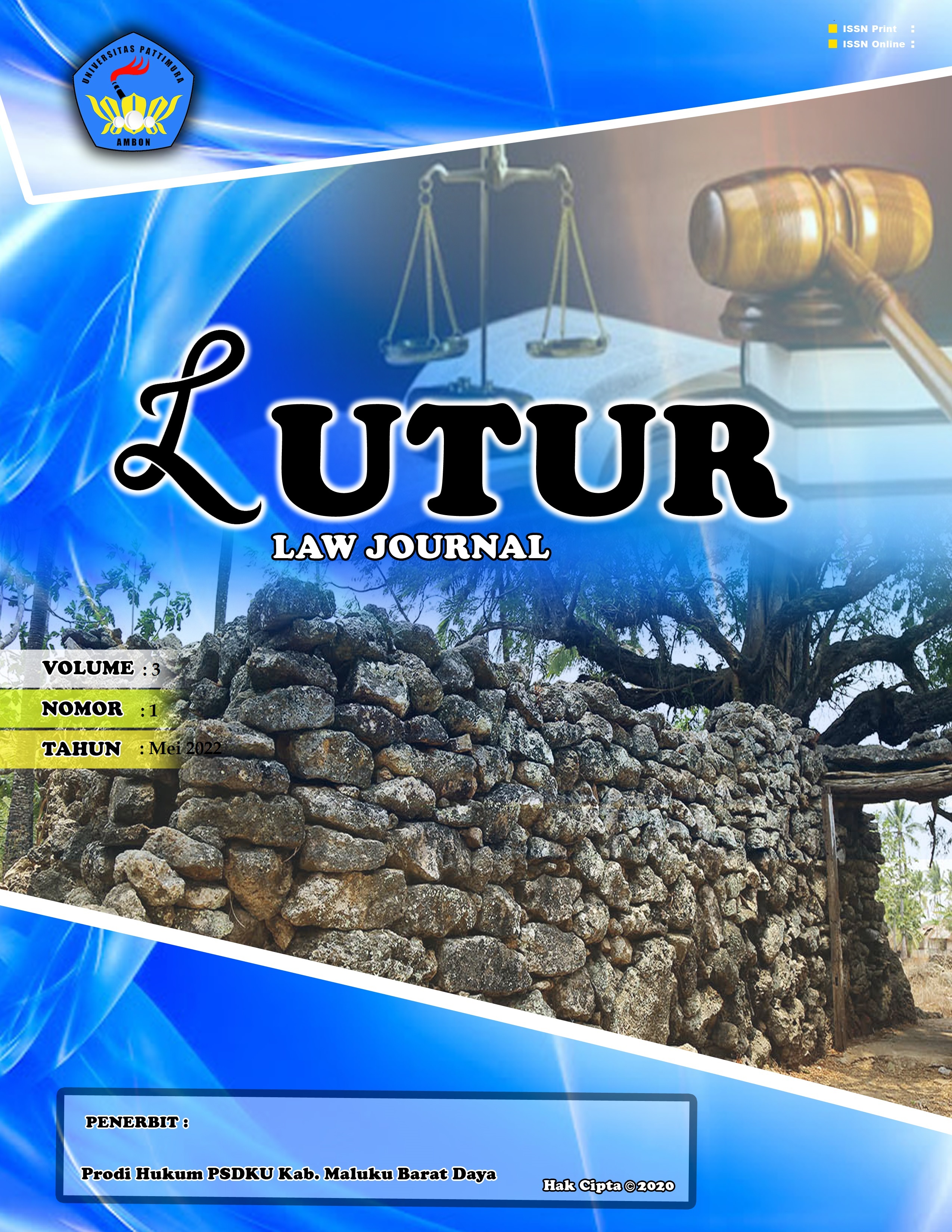Hak Waris Anak Perempuan Tunggal Menurut Hukum Waris Adat Di Pulau Kisar Kabupaten Maluku Barat Daya
Abstract
Women and men have the same position before the law regardless of gender, including the right to inherit. This research was carried out by referring to the type of normative legal research, or what is usually referred to as normative legal research or juridical where researchers will conduct a study of documents in the form of research conducted by examining literature sources and secondary data only, the type of research is descriptive analytical through an approach statutory and conceptual, guided by primary sources of legal material in the form of the 1945 Constitution of the Republic of Indonesia and the Civil Procedure Code as well as secondary and tertiary legal materials through the card system mechanism. Based on the research and presentation of the results and discussion, it was concluded that girls according to customary inheritance law on Kisar Island, especially in the community in Lebelau Village, North Kusar District, Southwest Maluku Regency, are not heirs, especially with regard to inheritance. This is influenced by the kinship system in adhered to by the people on Kisar Island in general, namely the patrilineal system so that sons become the heirs of priority according to customary law. The fulfillment of the inheritance rights of a daughter or only daughter in the family only includes inheritance that is the result of the income of the parents, where the fulfillment of these rights is very dependent on the wisdom of the parents.
Downloads
References
Artikel Jurnal
Mahrita Aprila Lakburlawal dkk, Penyuluhan Hukum Tentang Perlindungan Hak-Hak Perempuan di Desa Rumberu Kecamatan Inamosol Kabupaten Seram Bagian Barat, AIWADTHU Jurnal Pengabdian Hukum Vol 1 Nomor 2 September 2021, 85-93, https://fhukum.unpatti.ac.id/jurnal/aiwadthu/article/view/670/415,
Buku
Hilman Hadikusuma, Hukum Waris Indonesia Menurut Perundangan, hukum Adat, Hukum Agama Hindu-Islam, Citra Aditya, Bandung, 1991.
Lidwina Inge Nurtjahyo, Perempuan dan Anak Dalam Konstelasi Beberapa Hukum Waris Adat di Indonesia (dalam buku Perempuan dan Anak dalam Hukum dan Persidangan Editor Sulistyowati Irianto dkk), Yayasan Pustaka Obor, Jakarta, 2020.
Oemarsalim, Dasar-Dasar Hukum Waris Di Indonesia, Bina Aksara, Jakarta, 1993.
Soerjono Soekanto dan Sri Mamuji. Pengantar Penelitian Hukum. Jakarta: UI Press, 1986.
Ter Haar, Asas-Asas dan Sususnan Hukum Adat Beginselen en stelselvan het adatrecht Terjemahan Soebakti Poesponoto, Jakarta: Pradnya Paramitha, 1991.
Wirjono Prodjodikoro. Hukum Warisan Di Indonesia, Sumur, Bandung, 1966.
Skripsi, Tesis, Distertasi, Online/World Wide Web dan Lain-Lain
http://digilib.unimed.ac.id/36854/4/6.%20NIM%203153311020%20CHAPTER%20I.pdf.
Copyright (c) 2022 Mathias Kristison Maromon, La Ode Angga, Mahrita Aprilya Lakburlawal

This work is licensed under a Creative Commons Attribution-NonCommercial 4.0 International License.
Authors who publish their manuscripts in this Journal agree to the following conditions:
- The copyright in each article belongs to the author, as well as the right to patent.
- Authors are able to enter into separate, additional contractual arrangements for the non-exclusive distribution of the journal's published version of the work (e.g., post it to an institutional repository or publish it in a book), with an acknowledgment of its initial publication in this journal.
- Authors are permitted and encouraged to post their work online (e.g., in institutional repositories or on their website) prior to and during the submission process, as it can lead to productive exchanges, as well as earlier and greater citation of published work.
- Authors have the right to self-archiving of the article (Author Self-Archiving Policy)














